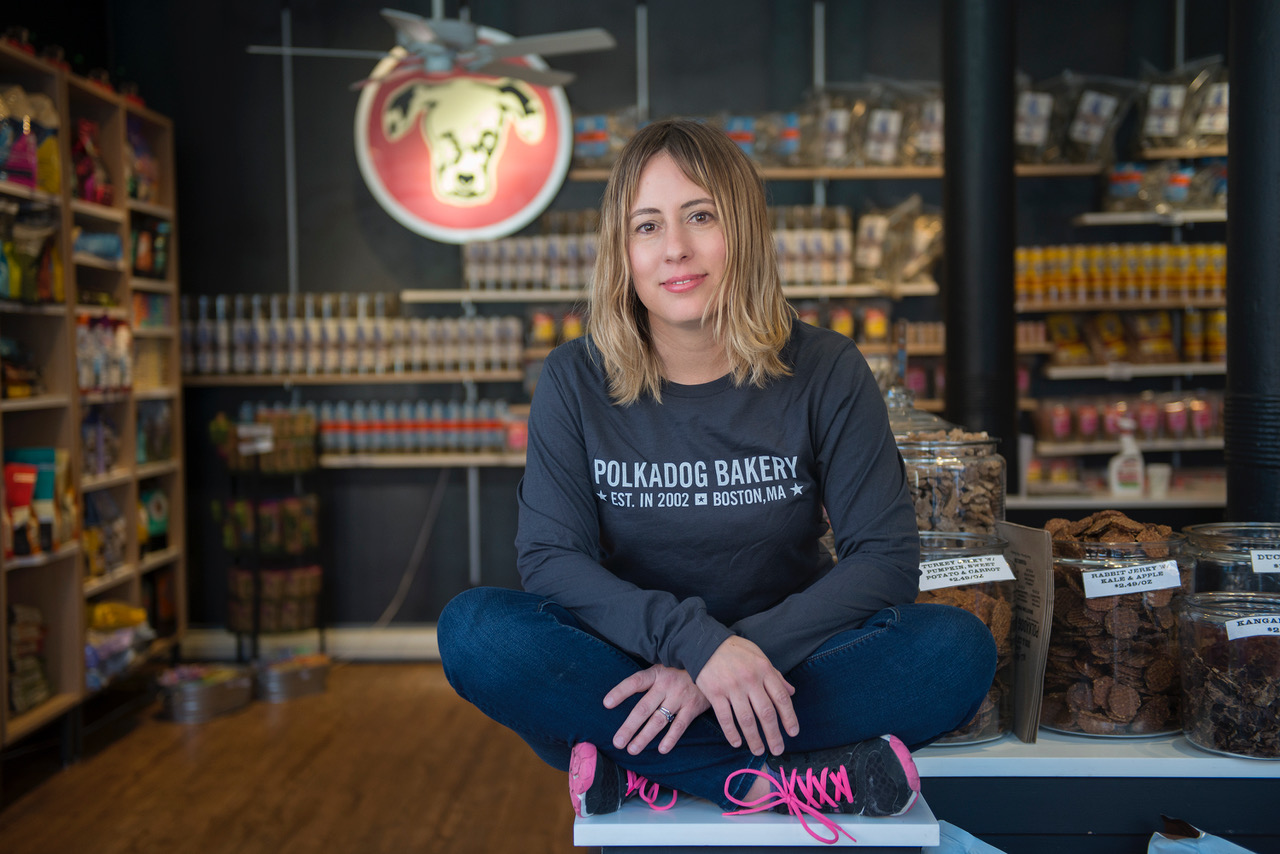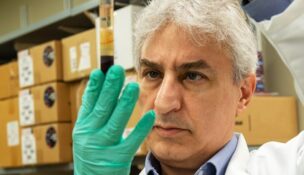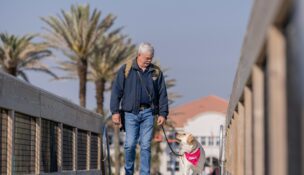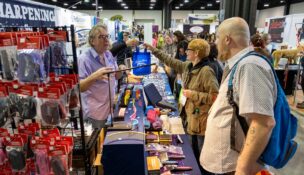Polkadog Bakery is Proud of its Boston Roots
Colleen Murphy //September 12, 2018//
Working right off the Boston Fish Pier, Polkadog Bakery co-founder Deb Suchman is hands-on at every step of the process—so hands-on she even knows where the fishermen’s children are applying to college.
Q Your focus is on fish. Why is that your protein source of choice?
A Well, we make a bunch of different treats. We’re manufacturing the entire treat from scratch, so we keep it simple and find quality grain, fish and meat. We make limited- and single-ingredient dehydrated treats. When we’re developing a new treat, it’s the ingredient that we are researching, the ingredient that’s important. We found top-quality chicken, raised by farmers in Maryland and Delaware. So from that chicken we created Chicken Littles. Chicken Littles are a treat made mostly from that chicken, with some added healthy brown rice and potato flour. It’s as healthy and sustainable as it gets. We make Chicken Strips. When we make Chicken Strips, here’s our ingredient list: chicken.
So why fish?
Several years ago, when researching, I discovered the health benefits of fish skin for dogs. Fish is easily digested, rich in Omega-3 fatty acids, and great for a dog’s skin and coat. Omega-3s are so important to the overall dog’s health of a dog!
They help support a dog’s cardiovascular health and the immune system, and can even fight inflammation.
Then I learn that fish skins are often a co-product—fish processors have many co-products that aren’t frequently purchased by local restaurant chains or groceries. A lot of fishing and processing takes place in the Boston area. Really, it was easy for me to meet the fishermen, to confirm their fishing practices aligned with our own ideas of sustainability. I have a friend at the Massachusetts Department of Agriculture; she’s an amazing resource. She knows many local producers and knows the ecology of the waters nearby, and she tells me that using the cod skins will be a terrific boon for fishing businesses that are committed to the idea of sustainability. That’s how we developed Cod Skins. Now we make Cod Skins and Haddock Skins and Clam Chowda. I mean, if that’s not Polkadog, I don’t know what is.
She also introduces me to whom I call the New Bedford Clam People. So I talk to my contact at the National Oceanic and Atmospheric Administration because I want to know what the NOAA is seeing for local fish, what’s healthy and sustainable. I learn Ocean Quahogs are part of a sustainable fishery, which has been regulated for the past 34 years by the National Marine Fisheries Service. All the clams are harvested in U.S. fishing waters under U.S. Federal regulations by U.S. flagged vessels. The domestic offshore clam industry in the USA is considered by many around the world to be among the best-managed fisheries on the planet. The clams are harvested in pristine waters 50-100 miles offshore.
And now Polkadog makes Clam Chowda sticks.
We make many treats with fish as the protein source because it is healthy for dogs, and available in a way that is sustainable and healthy for our local ecology and economy. And I know this not only on an abstract theoretical level, but on the practical level of living and making.
Q You say your cod skins was a game changer for your company. How so?
A For Polkadog, Cod Skins changed everything—or, at least, Cod Skins finally articulated what it was we had been trying do with our business. Cod Skins are healthy—extremely nutrient rich and accessible to many dogs, even those dogs who have allergic reactions to chicken and beef and other protein sources. But for Polkadog, the process of researching and developing and making the Cod Skins opened the door to a new way we could cooperate and collaborate with local business and industry. Making Cod Skins expanded our understanding of what we could do with our commitment to handmade, sustainably produced treats.
I already mentioned Polkadog’s Clam Chowda sticks. I didn’t mention that local companies primarily use the clam’s white meat to make a pure white clam chowder. New England clam chowder is iconic, and it won’t change. So my experience with making Cod Skins and committing to that process leads directly to the most natural idea: we’ll take the co-product of a sustainable local product, the Ocean Quahog, and use the low-calorie dark meat, rich with all the tasty omegas and chondroitin, and make Clam Chowda sticks! Ocean Quahog is maybe the most sustainable protein in the ocean, so… yeah. We work our asses off when it comes to research, but it has paid off in the form of a process. And that’s changed everything about how Polkadog can be Polkadog.
Q Your packaging really stands out. What message do you want the design to connote?
A We have spent a great deal of time and energy over the years collaborating with Jan, our designer, working with the Polkadog brand and packaging design. It is a very long process, and because it is a process, it continues. We go through versions, then revised versions, and then more revised versions of our Idea, as the Polkadog Idea expands and evolves.
All the details are important to us… I love them all! We love how we make our treats, and so we try to show that loving, painstaking experience in how we draw out our brand, our packaging designs. How do you convey a commitment to healthiness and sustainability in a brand or label? How do you express the belief that healthy treats can be delicious to cats and dogs without saturating them with salt and sugar? So we work with Joe, a local illustrator, who draws by hand everything he creates, including the cod and haddock and chicken on our packaging. That’s what Joe does. That’s his art. How could that not speak to the handmade nature of our treats? There’s nothing magical about it, but you have to believe that the process never ends… that it encompasses every aspect of making a treat from scratch.
We want our product designs to feel colorful, friendly, approachable and uniquely our own. Uniquely Polkadog.
Q Operating off of the Boston Fish Pier, you are hands-on throughout the entire process. Why is that important to you?
A When I make treats in Boston, I am making them with the employees that I hired. I’m making them with peanut butter from a guy whose place is a couple miles away from where I live. When I make treats at our kitchen at Boston Fish Pier, I am making them with fishing crews and processors of fish—guys I know, that I meet and talk to several times a week; I meet the captain, you know what I mean? These guys have kids and I know where some of them are applying for college! If Polkadog lives where I live, it means I can keep saying, “these are my treats.”
Every brand these days has an origin story, and every business has a strategy. That’s fine. Polkadog has a story, too. But working with people who do things, who make things, who see some good and worthy purpose that only comes from working collaboratively—that’s my thing.
So many brands these days are attached to products manufactured by third party companies. The people who run those companies, they don’t know what’s in the bag.
I can’t slap a brand on something, then let other businesses design and source and manufacture a product and feel that’s a job well done. Collaborating with another manufacturer is one thing, but allowing a third-party producer to design and develop all your products is not what Polkadog wants to do. Who grew the grains and caught the fish? Who ensures this is a sustainable practice? How do I know these companies care about their product? If there’s a difference between making and producing, then that’s the difference I’m trying to live. When I make a treat my way, I know it comes from sustainable, healthy ingredients. I always know what’s in the bag.
Q You will soon be moving to a new 14,000-square-foot kitchen. How do you expect that to impact your business?
A In the past four years, we have gone from a 4,000-square-foot space to an 8,000-square-foot space, and we will soon be moving to a 14,000-square-foot space that will house our kitchen, packaging and corporate offices. How exciting is that? We’re about one month away! We have seen such a huge increase in demand for our treats, but we often have to explain that our commitment to the process of developing and making our treats in our own kitchen limits the amount of contracts we can accept.
We started designing our ideal kitchen several years ago, a space that would maximize productivity and with the equipment we always wanted for the research and development of new treats. I love the idea of having expanded capacity but for me growing also means expanding the process: making new and better treats. Really, I can’t wait.
We have seen a great deal of interest in the idea of exporting our treats. In fact, we just shipped our first major drop of Polkadog treats to South Korea. We have a new exclusive distributor and marketing partner in Seoul: Purple Nest. They have been working diligently on developing and executing a marketing strategy, and a roll out for the Polkadog brand in South Korea. We picked a partner that would not only distribute and sell Polkadog treats in South Korea to retail stores but also truly and holistically represent the Polkadog brand.
Our new space at Boston Fish Pier makes these new relationships possible… just a few more weeks!



















